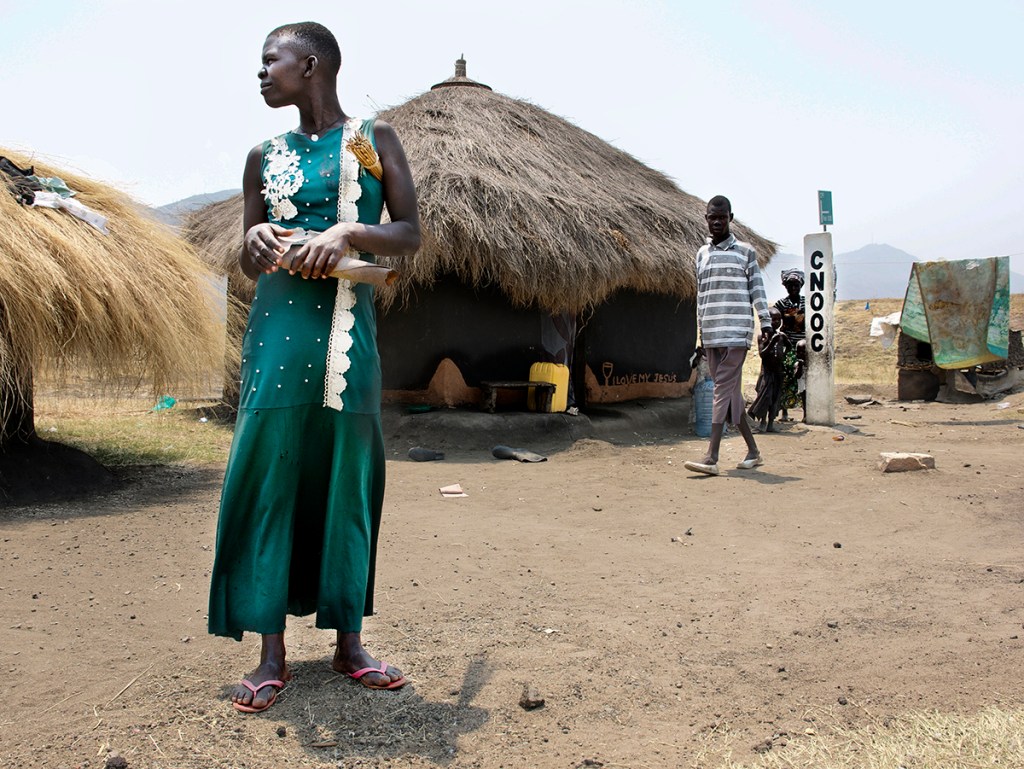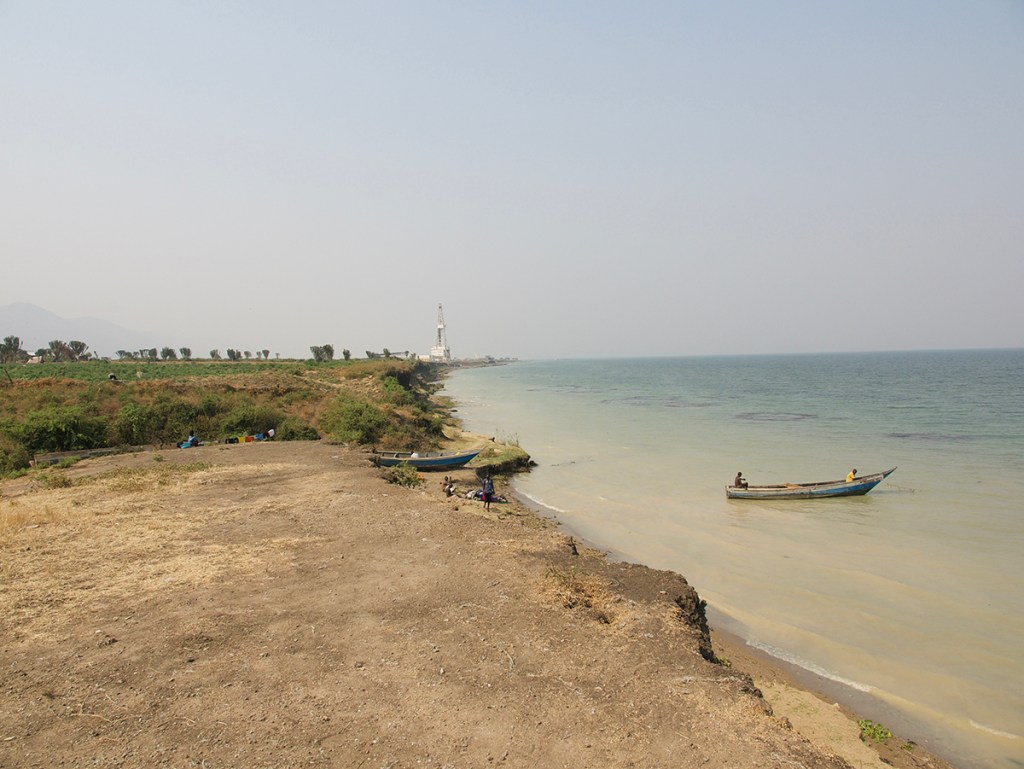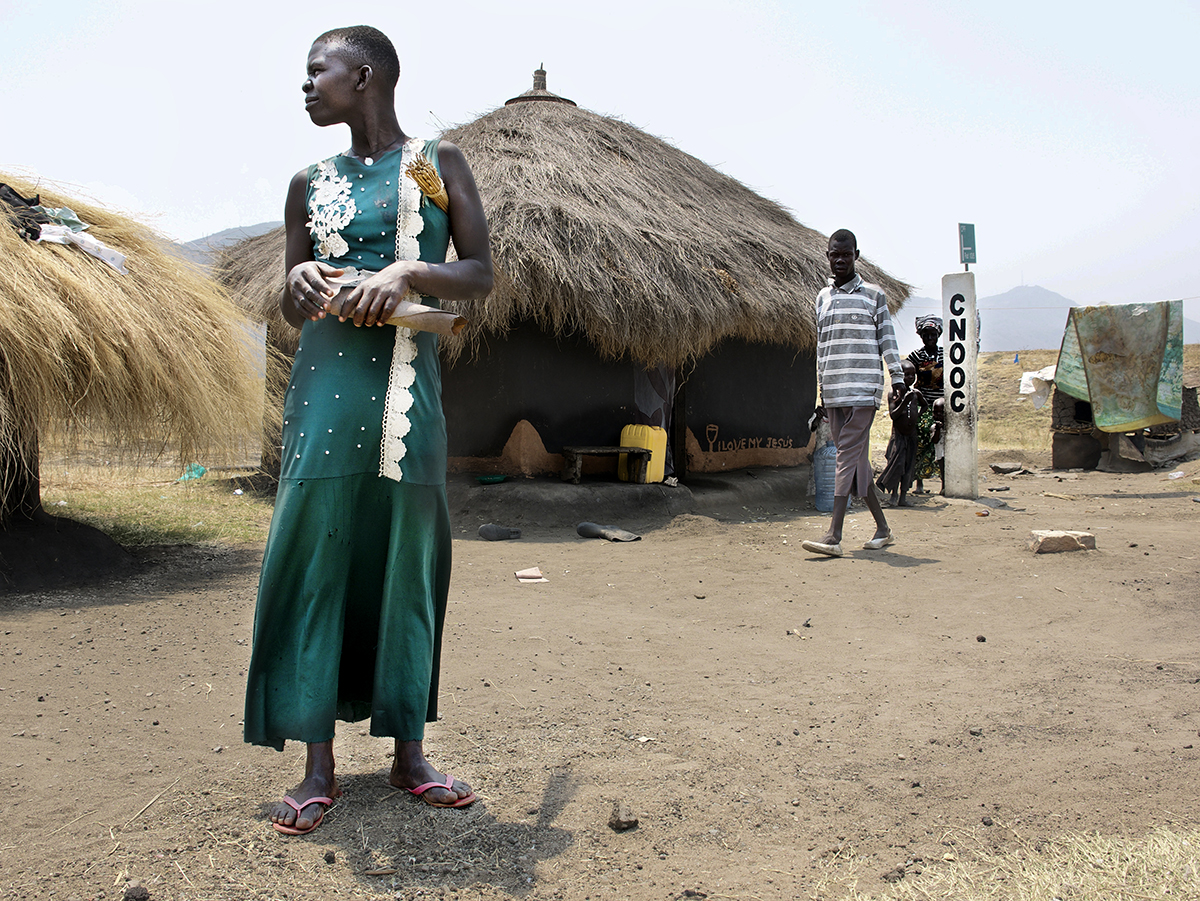
Photo: Just Finance International (2023)
Early this year Uganda’s President Yoweri Museveni officially launched the oil drilling activities at the Kingfisher Development Area. This was celebrated as an important milestone in Uganda’s multibillion-dollar pipeline and oil drilling project. But in the villages located next to the oil wells, nobody is praising the drilling.
In front of Uganda’s Lake Albert, a newly paved road wriggles down a steep mountain side. From halfway down the hill, the strong haze from the sun makes it hard to determine where the flat shore ends and where the lake begins. What is distinguishable is a settlement comprising hundreds of small traditional houses, one tall oil rig and a large blue-roofed compound at the settlement’s center.
Massive change appeared in Kyakapere beginning in 2008. Within this small traditional fishing community, houses were rapidly demolished, land ownerships changed hands and workers showed up from China and other regions in Uganda. In another two years, this small fishing community, with its original 6000 inhabitants, will not only concede more land to hundreds of additional workers from abroad but to four well pads, 20 production wells, and 11 water injection wells.
The Kingfisher project area is operated by China’s parastatal oil company, China National Offshore Oil Corporation (CNOOC). Compared to French TotalEnergies, its partner in the East African Crude Oil Pipeline project (EACOP), CNOOC has kept a low profile and largely avoided all media contacts.
Until recently, the mountain road leading to the Kingfisher area prohibited all visitors except for those working or living there. Therefore, virtually nothing about the conditions of the Kingfisher project has been reported by civil society organisations or independent media.
When Just Finance International (JFI) arrived at the site in February 2023 the roadblock at the top of the mountain was unmanned and all cars were able to pass. During the visit, JFI members were able to meet with around 100 project-affected people from two different locations.
The JFI team was able to move around within the community and came close to the oil operation activities. The oil operations were located surprisingly close to the fishing community’s residential areas—sometimes just a few meters apart. In some places, stray cattle prodded around in the middle of the construction site.
Snatched land
Before CNOOC’s oil operations commenced, there were no land titles in Kyakapere village. Villagers paid no heed to who had the legal ownership of the land they all collectively used. Generations passed without any major disputes, an arrangement recognised in the constitution of Uganda.
The villagers began to hear about plans for oil extraction in 2008. Negotiations between the village and CNOOC were led by a small delegation of elders, which later resulted in many complaints of mismanagement. Instead of creating one land title for each family, CNOOC transposed the whole scattered village onto one big land title.
People who had to be relocated were told they could choose to either move to a new house or receive the compensation in cash. But those who chose the house did not get a chance to see the house—or even sketches of their promised residence—in advance. Instead of building traditional Ugandan houses, comprised of several small buildings, the company constructed chain houses with very small plots. Many of the villagers say they were disappointed when they were finally brought to their new homes. All the relocated persons JFI met with said the houses were unsuitable for their needs and did not meet their traditions and customs.
“I am not satisfied. I want my land back,” said one man. His residence came without any furniture, and he received no money to furnish his new home. He also shared that he only had electricity for six hours a day.
Meanwhile, relocated persons who chose to receive cash report that their compensation payments were far too low. One woman was given 600 000 UGX (about 160 USD), only a fraction of the expense of building a new house in the area.

JFI spoke to another villager who had three houses expropriated by CNOOC. He received 700 000 UGX per house (187 USD) which was far insufficient to buy equivalent houses elsewhere. The situation took a heavy toll on his family, and his wife later moved out, leaving him behind with their children. “CNOOC’S operations broke families and brought tears”, he said.
Many villagers simply did not receive anything at all. Locals described to JFI incidents of people becoming homeless in CNOOC’s resettlement process. They were only given 24 hours to leave their property before bulldozers arrived and tore their house down.
Livelihoods lost
Among the benefits promised by CNOOC to the local population were new employment opportunities, scholarships and improvements to the community’s infrastructure, schools, and healthcare services.
Yet today, 15 years after the pledges were first made, none of the community members JFI met believe that the oil project has improved their lives. Some young people received temporary jobs from CNOOC, but their payment is low with few long-term prospects. Furthermore, the vast majority of work offered to the community has been hard unskilled labour. For example, during the construction of a new road down the mountain, men from the local village were hired to manually move large rocks and mix concrete for the well pads.
“The only thing CNOOC has done for this community is to build the road down the mountain. But all the heavy manual work was done by people from this community,” one man said. According to locals who spoke with JFI, such workers only receive about 10000 UGX per day (2,68 USD).
Rather than improving quality of life for the villagers, development on the oil rig has instead harmed local livelihoods. An older man told JFI that he had 67 orange trees before CNOOC came to Kingfisher. One day, without notifying him, the Chinese company cut them all down. He did not receive any compensation, nor even an explanation as to why this happened. The trees were an important source of income for the family. The man went to the village chairman, but his complaint was ignored.
Small agricultural plots once contributed an important component to villagers’ way of life. Yet even before they were evicted, many families were forbidden by CNOOC to plant any trees or develop the communal land. Some households have had to endure these restrictions since 2017, cutting them off from the possibility of cultivating their land and harvesting vegetables and fruits for their daily needs.

Raising livestock has also become more difficult since the oil operations began. “We have no room for the animals now and there is no room for the children to play,” one man told JFI. “Our life was going to be better according to CNOOC but it has become miserable. CNOOC has spoiled the life of the people in this community.”
CNOOC’s development project has even threatened the main source of income for the village: fishing in Lake Albert. The area’s first completed oil rig utilizes a strong light during night-time, which has reduced how many fish the villagers are able to catch. Many fishermen fear that this will affect the fishing even more when the oil project is completed and with more rigs in place.

For the past year, the consortium of CNOOC, TotalEnergies and the EACOP has paid for widespread advertising on television and social media promoting the benefits of the oil project and the generous compensation distributed to local villagers.
In one advertisement, a man is shown smiling and saying, “I got a new house and a job from CNOOC”. JFI found this man in the Kingfisher area and spoke with him. He confirmed that what he said was true, but he was one of the lucky few who received anything in compensation. Contrary to how he was portrayed in the advertisement, he said he felt very disappointed with how little the company has done for the community.
“When many people are moving here, we do not have enough hospitals nor schools. We only got one primary school. The roads need to be repaired and there is a lack of land titles which make the ownership unclear,” he said.
The man also bemoaned the lack of employment opportunities for skilled workers from the village. “There are many educated persons here, but they do not get any employment. We would like CNOOC to train our youth, but they do not. They don’t care about our education. Instead, they move workers here from other places in Uganda,” he said.
While the language barrier has made communications difficult between the Chinese company and villagers, many locals say the real problem is not lack of ability but lack of will. They say that CNOOC is not paying attention and is unwilling to listen to the community.
Just Finance international has, on a number of occasions, contacted CNOOC for a comment, but to date, both have yet to provide a response.
Fact: Kingfisher
CNOOC Uganda Limited operates the Kingfisher area which is the south Eastern flank of Uganda’s Albert Basian, a part of the Western arm of the East African Rift Valley. The field is approximately 15.2 km long by 3.0 km wide and covers an area of 32.3 km2. CNOOC Uganda Limited is a subsidiary of the state-owned China National Offshore Oil Corporation (CNOOC).

